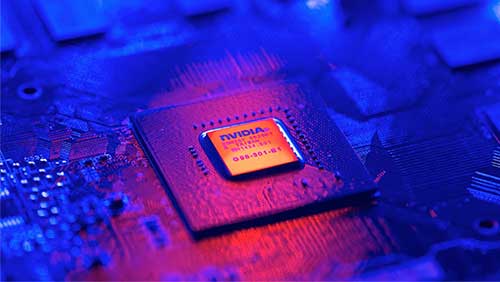A complexified world
Tom Slater – Manager, Scottish Mortgage Investment Trust
The impact of ever-faster networks and complex systems is all around us. Tom Slater reflects on the implications of our accelerating connectedness in an increasingly ‘complexified’ world.

The value of shares in Scottish Mortgage, and any income from them, can fall as well as rise and investors may not get back the amount invested.
There was a media frenzy earlier this year when Amazon CEO Jeff Bezos published details of an attempt to blackmail him with stolen photographs. In a blog post, Bezos suggested that his ownership of the Washington Post was a ‘complexifier’ leading one critic to suggest he should have engaged an editor and that the word ‘complicating’ would have done. It is dangerous to criticise a genius and it seems to me that Bezos’ quixotic use of language was justified. The situation was not complicated. It was complex.
I would like to explain the distinction and why it matters.

Complex systems are transforming our world and driving a process of accelerating change with big implications for investors. Companies that have relied on established market structures to extract high prices from their customers (for example broadcasters, consumer goods or oil companies) are likely to face great challenges. Those that earn their revenues by facilitating connections and taking a share of the value they create for their customers are in a much stronger position.
Complicated problems are hard to solve but often can be addressed with formulae, rules and processes. Many of today’s hierarchical institutions were created to solve complicated problems. However, approaches that work for complicated problems don’t work well with complex problems. Complex problems arise when a system has many connected parts which interact with one another. Our climate is a complex system, as is the human brain or our transportation network. Such systems involve too many unknowns and too many interrelated factors to be reduced to rules and processes. They behave in ways that are hard to predict even when you know a great deal about the individual components. Connections dramatically change the way the individual components of a network behave.
The explosion in the number of connected devices is leading to fundamental change in our society and our economy. This deeper level of connection makes us all part of a complex network. It is changing the way we behave as citizens, as consumers and as workers. Connection creates big new opportunities and we have seen phenomenal growth in social networks, ride-sharing companies and cloud computing. At the same time, it creates threats that our society is ill-equipped to counter from hacking and information theft through to terrorist infrastructure. The shape of our global network is evolving rapidly and there is still much that is unknown but those that understand and can influence this development are likely to possess significant advantage.
The networks we interact with on a daily basis accelerate the pace of our lives. In a networked world, having the closest and fastest connections is valuable. This creates a self-reinforcing drive towards ever greater speed. Our machines are always on. Ideas spread almost instantly and new movements grow and evolve in unexpected ways. The friction that has historically slowed our access to information is being removed and we are increasingly intolerant of barriers to speed.
Consequently, our political and military institutions are creaking. They are failing to address the implications of vast connected networks for nationalism and geopolitics, inequality of every kind, terrorism or climate change. Many of the large corporate institutions in which billions of pounds of savings are invested face similar threats as they fail to comprehend the rapidly changing expectations of their users and partners.

It is not just humans who are being connected. Billions of sensors are giving our computer networks an innate awareness of what is going on in the world around them. The power of connected computers has ushered in a new era of Artificial Intelligence, allowing machines to turn awareness into actionable insights. The applications of such collective intelligence will have profound effects on our society and we must absorb these changes at ever faster speeds. The next 10 years will bring self-driving cars. Drones will take on many roles now carried out by human workers. Computational biology will transform our understanding of disease. We will synthesise biology and use it in our manufacturing processes. More work must be done to understand the consequences of this progress and also to limit the less appealing aspects.
An inherent feature of a complex system is that there is no permanent equilibrium. The state of the system is constantly changing. We can no longer expect that market structures will endure indefinitely, that corporate advantages will persist or that consumers will behave in a predictable way. Instead a position of advantage within the network becomes a more important source of competitive edge, as does the institutional ability to adapt quickly to a changing environment. We are often asked about Scottish Mortgage’s exposure to technology or to emerging markets (both unhelpful groupings advanced by the manufacturers of stock market indices). When 1.4 billion Chinese consumers and entrepreneurs are milliseconds away it surely makes little sense to segregate the world by geography? Similarly, networks affect every company, not just the subset that are deemed to be ‘Technology Companies’. It is far more relevant to distinguish between those that have understood network power and those that have not.
It is obvious that a small handful of internet companies have understood the power of networks. Microsoft, Alphabet and Facebook between them have bought and built 12 products with more than a billion users. Tencent and Alibaba are not far behind. These products become more appealing to each user as the total number of users grows. This makes rival services unlikely. The companies have become more profitable and often grown faster as they have got bigger. They are gatekeepers to networks which allows them to build any number of profitable and useful services. We think the potential of several such companies is still only dimly perceived and a long way from being reflected in valuations. Regulators across the globe are scrambling to understand but until they grasp the network-centric nature of these companies’ market position they will find it hard to exert influence.

There are many other implications of a networked society and we spend much of our time trying to understand the entrepreneurs and businesses that are shaping its development. Our holdings in Airbnb and Lyft are demonstrating the power of this model in reconstructing the accommodation and transportation markets. So too are Delivery Hero, GrubHub and Meituan in the food industry. TransferWise matches buyers and sellers of currency through its network avoiding the need for money to cross borders and incur the associated fees. Most of the new successful businesses we look at are harnessing network effects to create new markets or disrupt existing industries.
It isn’t necessary to be a young company to encounter and exploit the opportunities presented by a connected world. When established businesses have leadership and vision the results they can achieve are remarkable. Kering is a fine example. Its Gucci subsidiary has doubled sales in the past two years through careful attention to its brand and the way it uses technology to build deep connections with its customers. Conversely, for those that get it wrong, the consequences are immediate and can be hugely damaging.
The impact of greater complexity and the power of networks is all around us. Mr Bezos understood this long before most people. As investors, we must simultaneously absorb and understand the implications of accelerating connectedness whilst stepping back from it to seek space for reflection. We can see the malign consequences of ever-faster networks in our stock markets and the shortening time-horizons this inflicts on corporate management teams. Our aim remains patiently to support the companies we think can navigate this complex world over the long term.
Risk Factors
Scottish Mortgage invests in overseas securities. Changes in the rates of exchange may also cause the value of your investment (and any income it may pay) to go down or up.
The Trust has a significant exposure to unlisted investments. The Trust’s risk could be increased as these assets may be more difficult to buy or sell, so changes in their prices may be greater.
The trust invests in emerging markets where difficulties in dealing, settlement and custody could arise, resulting in a negative impact on the value of your investment.
About the author - Tom Slater
Manager, Scottish Mortgage Investment Trust
Tom Slater is manager of Scottish Mortgage Investment Trust and head of Baillie Gifford's US Equities Team. Tom's focus is on high-growth companies.
Important information
This communication was produced and approved at the time stated and may not have been updated subsequently. It represents views held at the time of production and may not reflect current thinking.
This content does not constitute, and is not subject to the protections afforded to, independent research. Baillie Gifford and its staff may have dealt in the investments concerned. The views expressed are not statements of fact and should not be considered as advice or a recommendation to buy, sell or hold a particular investment.
Baillie Gifford & Co and Baillie Gifford & Co Limited are authorised and regulated by the Financial Conduct Authority (FCA). The investment trusts managed by Baillie Gifford & Co Limited are listed on the London Stock Exchange and are not authorised or regulated by the FCA.
A Key Information Document is available by visiting our Documents page.
Any images used in this content are for illustrative purposes only.





